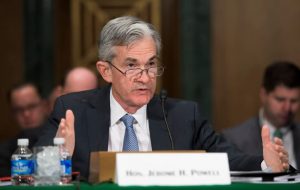Sobering Words from Fed Chairman Powell

Chairman of the US Federal Reserve Bank: Jerome Powell
This morning, investors are taking stock after being administered a measure of sobering realism by Jerome H Powell, chairman of the US Federal Reserve Bank. Exchanges in Asia and Europe opened on a low and showed little oomph as the day progressed. All major indices sagged on Mr Powell’s warning that the pandemic could cause permanent damage to the US economy unless Congress and the White House expand financial support to businesses. Failing to do so, he said, will result in a wave of bankruptcies and ‘prolonged joblessness’.
The Fed chairman said that the approximately $3 trillion already released by Congress may not be sufficient to keep companies and households from going under. Mr Powell fears that the Corona Recession may last longer than expected, thus requiring additional support. During a virtual event organised by the Peterson Institute for International Economics, Mr Powell said that the recovery may take some time to gather momentum: “Additional fiscal support could be costly, but worth it if it helps avoid long-term economic damage and leaves us with a stronger recovery.”
Mr Powell’s blunt assessment of the country’s predicament may have been born out of frustration. Over the past two weeks, the Fed has approached both Congress and the Trump Administration to explain the limits of central bank interventions and the need to prepare for a longer than expected economic slump. However, the message was lost, and its urgency denied, as the bipartisan resolve to provide succour to the ailing nation has been replaced by bickering. Meanwhile, the administration seems obsessed with forcing an early return to normal and apparently has lost all interest in the medical side of the pandemic.
In Congress, Republicans express a growing concern over the ballooning federal deficit which is on track to reach $3.7 trillion this year. According to the Congressional Budget Office (CBO), the national debt will eclipse US economic output ending the year at 101 percent of GDP. The CBO expects the economy to shrink by 5.7 percent in 2020 and unemployment to reach 16 percent by the third quarter.
In his online speech, Mr Powell warned that now is not the time to fret about deficit spending. He said the US economy is currently facing its biggest shock of modern times and called on lawmakers to prevent ‘avoidable’ business insolvencies which could depress growth rates later on. He also fears that essential job skills may be lost due to prolonged unemployment, further hampering the post-corona recovery.
A survey conducted by the US Federal Reserve Bank and released today shows that in households making $40,000 a year or less, 40 percent of those who held a job in February went without one a month later. Today, the Bureau of Labour Statistics is to announce that another two million Americans filed for unemployment benefits last week, pushing the number of jobs lost to the pandemic to an estimated 33 million.
Appearing of Fox News, Treasury Secretary Steven Mnuchin seemed unfazed and assured viewers that most jobs will return as soon as the economy opens up for business. Mr Mnuchin said that the administration is doing ‘all it can’ to support businesses and household but doesn’t recognise the need to double down yet.
A $3 trillion aid package prepared by Democrats and expected to reach the floor of the House on Friday is superfluous to requirements, according to the Treasury Secretary. Mr Mnuchin called the proposed legislation ‘partisan’ and emphasised that his department has been working with the Fed to prepare a $2.5 trillion Main Street Lending Facility for struggling businesses: “I’ve only allocated half of the money, so to the extent that we need another $2.5 trillion, that’s there as well.”
Mr Mnuchin agrees with Fed Chairman Powell that the pandemic may destroy the US economy but wants to avoid lasting damage by pushing for an early end to the lockdown instead of expanding the federal aid programme.
Yesterday, President Donald Trump clashed openly with Dr Anthony Fauci, the well-liked and respected director of the National Institute of Allergy and Infectious Diseases, who had warned that opening the economy ‘too soon’ could ‘turn back the clock’ on efforts to contain the spread of the novel virus. He also said the early lifting of stay-in-place orders decreed in many states could bring ‘more suffering and death’.
President Trump called Dr Fauci’s advice, given during a Senate hearing, ‘unacceptable’ and went on to accuse the doctor of wanting to ‘play all sides of the equation’. Mr Trump seemed particularly irked by Dr Fauci’s comment on his administration’s ‘cavalier’ attitude to the risk of children suffering ‘deleterious effects’ of the disease.
Medical researchers in Italy have found that some young children who carry coronavirus antibodies are severely affected by an inflammatory syndrome that could be linked to covid-19. In his statement to the Senate, Dr Fauci cited the study – published earlier this week in the prestigious medical journal The Lancet – and cautioned against the reopening of schools.
Physicians in 15 US states have identified 164 children with symptoms similar to the rare Kawasaki Disease. Most cases have popped up in corona hotspots. Medical authorities in the UK, Spain, and France also reported a spike in Kawasaki-like cases amongst children carrying coronavirus antibodies.
Returning to the political fight over the next steps to follow the initial federal response to the pandemic, Senate Majority Leader Mitch McConnell said that he is in no ‘hurry’ to table any new support packages and will wait until after Labour Day – the first Monday of September – to consider his options. The Republican senator then confirmed the, verifiably wrong, notion that his party continues to honour its tradition of prudence in the management of taxpayer money.
Historical data from the Bureau of Economic Analysis show that, contrary to public perception, Republican administrations have added considerably more to the national debt than Democratic ones. Averaging the numbers since the end of World War II, a clear picture emerges that puts paid to the notion that Democrats overspend whilst Republicans cut expenditure.
Fed Chairman Powell considers the increasingly acerbic debate on the hill a dangerous waste of time and stresses the need for immediate remedial action. Senator Patrick Toomey (R, PA) was unimpressed and said that pumping additional taxpayer money into the economy was likely to do more harm than good. Senator Kevin Cramer (R, ND) dismissed Mr Powell’s warnings as the ‘opinion of one man’.
Market watchers and analysists fear that the $3 trillion thus far invested in economic life support may turn out to have been largely wasted should a follow-up package fail to materialise and force companies into bankruptcy before the recovery gets underway. Changing course mid-pandemic, before the curve has truly been flattened, is seen as the worst of all possible outcomes since it does nothing to help bolster business and consumer confidence and threatens to prolong the emergency.
Reports from states that have progressively relaxed lockdown restrictions indicate that a significant number of consumers and workers still prefers to stay at home for fear of contagion. In those states, businesses struggle to keep their doors open for want of staff and customers.
Though President Trump may ignore the admonitions of Mr Powell and Dr Fauci, most investors did take note, heeded the warnings, and headed for the exit. A new normal will undoubtedly dawn before long, but not quite yet. The pandemic must be allowed to run its course before declaring ‘mission accomplished’.
You may have an interest in also reading…
Where are We Going? Nowhere, Fast, According to Travel and Tourism Stats
Whether domestic or international, business or pleasure, travel is an integral part of modern life — no longer just a
Shock and Ore — India’s Love of Gold Goes Beyond Market Prices
Gold is considered the most valuable of all the precious metals — especially in Indian culture. While the fabulous ore
Home is Where the Mortgage is: 2008 Crisis has Lessons for Sector
Of all the sectors affected by the pandemic, the housing market has performed better than expected. In 2008, home loans

















































































